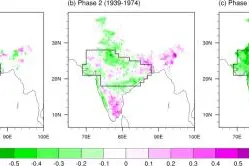PHOTO
- Atlantic Zonal Mode (AZM) and Indian summer monsoon rainfall (ISMR) are known to have an inverse relationship, which means that the cold (warm) phases of AZM result in strong (weak) ISMR.
- This paper reports that the inverse relationship between AZM and ISMR has significantly strengthened in recent decades.
- The findings have been featured in Geophysical Research Letters.
Abu Dhabi: A new study at NYU Abu Dhabi (NYUAD) has discovered a growing teleconnection in a warming world between the Indian Summer Monsoon Rainfall, which affects millions of people in India, and the Atlantic Zonal Mode.
Led by senior scientist at NYUAD’s Center for Prototype Climate Modeling (CPCM) Ajaya Ravindran, the research team found a robust increase in the interannual variability of the Sea Surface Temperature (SST) over the eastern tropical Atlantic Ocean as a result of global warming.
This increase in variability implies an increase in the number of Atlantic Zonal Mode (AZM) events, inducing strong Kelvin waves - disturbances seen near the earth's equatorial atmosphere - into Indian Ocean. This, as a result, leads to strengthening the teleconnection between the Atlantic Zonal Mode and the Indian Summer Monsoon Rainfall.
Consequently, the cold phases of the Atlantic Zonal Mode enhance the Indian Summer Monsoon Rainfall whereas the warm phases of the Atlantic Zonal Mode weaken the Indian Summer Monsoon Rainfall. Atlantic Zonal Mode is defined as the year to year variability of the sea surface temperature anomalies (departure from mean) over the eastern tropical Atlantic Ocean.
Researchers documented the evolving changes in the relationship between the Atlantic Zonal Mode and the Indian Summer Monsoon Rainfall in various decades. They examined the possible physical mechanism behind such changes by analyzing century-long observed rainfall and Sea Surface Temperature data.
The study suggests that El Niño variability, which refers to the warming phase of the sea surface temperature, as the most important teleconnection that affects the Indian Summer Monsoon. It is found that El Nino-Monsoon teleconnection weakens in several years. The present study suggests that the teleconnection between Atlantic Zonal Mode and Monsoon also plays a crucial role in deciding the fate of the monsoon, especially after the 1980s.
"Our discovery of the growing role of tropical Atlantic sea surface temperature anomalies on Indian summer monsoon in a warming world brightens the prospect of Indian summer monsoon prediction,” explains Ravindran.
-Ends-
About NYU Abu Dhabi
NYU Abu Dhabi is the first comprehensive liberal arts and science campus in the Middle East to be operated abroad by a major American research university. NYU Abu Dhabi has integrated a highly-selective liberal arts, engineering and science curriculum with a world center for advanced research and scholarship enabling its students to succeed in an increasingly interdependent world and advance cooperation and progress on humanity’s shared challenges. NYU Abu Dhabi’s high-achieving students have come from 120 nations and speak over 120 languages. Together, NYU's campuses in New York, Abu Dhabi, and Shanghai form the backbone of a unique global university, giving faculty and students opportunities to experience varied learning environments and immersion in other cultures at one or more of the numerous study-abroad sites NYU maintains on six continents.
Media Contact:
Maha Ayash
Four Communications
NYUAD@fourcommunications.com
+971 55 178 3906
© Press Release 2019Disclaimer: The contents of this press release was provided from an external third party provider. This website is not responsible for, and does not control, such external content. This content is provided on an “as is” and “as available” basis and has not been edited in any way. Neither this website nor our affiliates guarantee the accuracy of or endorse the views or opinions expressed in this press release.
The press release is provided for informational purposes only. The content does not provide tax, legal or investment advice or opinion regarding the suitability, value or profitability of any particular security, portfolio or investment strategy. Neither this website nor our affiliates shall be liable for any errors or inaccuracies in the content, or for any actions taken by you in reliance thereon. You expressly agree that your use of the information within this article is at your sole risk.
To the fullest extent permitted by applicable law, this website, its parent company, its subsidiaries, its affiliates and the respective shareholders, directors, officers, employees, agents, advertisers, content providers and licensors will not be liable (jointly or severally) to you for any direct, indirect, consequential, special, incidental, punitive or exemplary damages, including without limitation, lost profits, lost savings and lost revenues, whether in negligence, tort, contract or any other theory of liability, even if the parties have been advised of the possibility or could have foreseen any such damages.




















